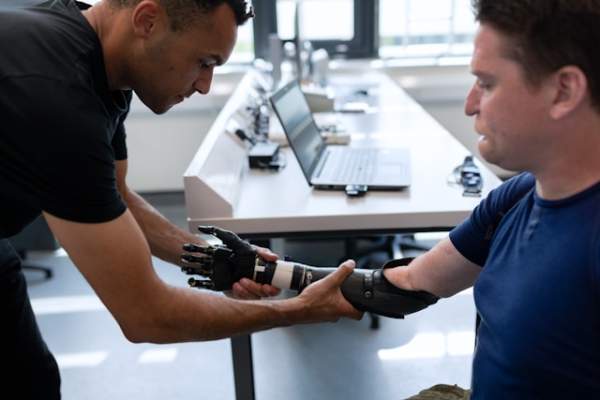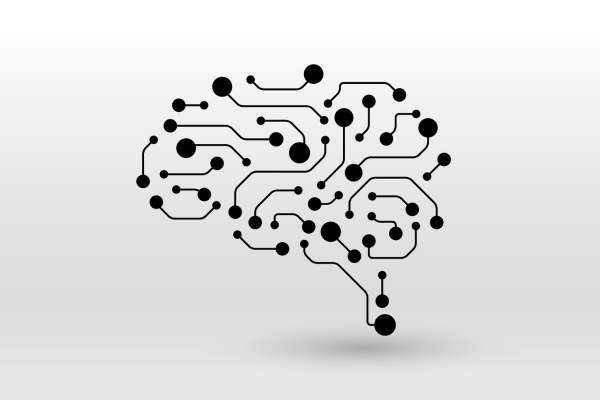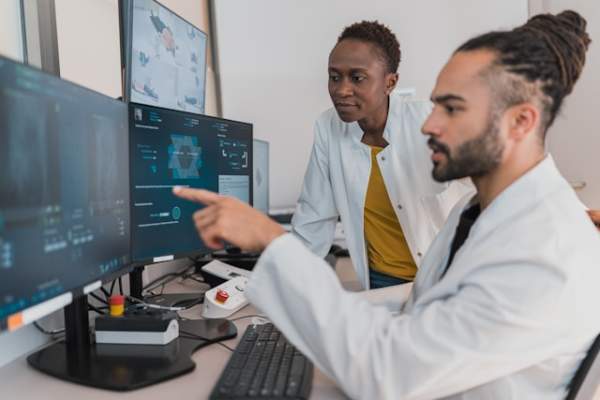The Top 5 Ways AI can transform the NHS in the UK

The UK's National Health Service (NHS) is one of the largest and most complex healthcare systems in the world. While the NHS has traditionally moved cautiously when adopting new technology, many aspects of AI are increasingly becoming part of everyday clinical support in areas like radiology, diagnostics, and remote monitoring. With tools already live in some trusts, and new deployments accelerating under NHS England's AI Diagnostic Fund, the role of AI in improving patient care is becoming more tangible. In this article, we explore how AI is already reshaping the NHS and where it's headed next.
What is Artificial Intelligence?
Artificial Intelligence (AI) is specialist software that allows a machine to imitate intelligent human behaviour. It encompasses a broad range of technologies that enable machines to sense, comprehend, act, and learn. AI is powered by algorithms that are designed to process data, make decisions, and perform tasks that typically require human intelligence, such as visual perception, speech recognition, decision-making, and language translation. Now that we’ve covered what AI is, let’s take a look at how the NHS can harness the power of this innovative technology to improve day-to-day operations:
Improving Diagnostic Accuracy
AI technologies are particularly adept at analysing complex medical images. Algorithms can be trained to detect anomalies in X-rays, MRI scans, and other imaging formats with a level of precision that may surpass human capabilities. For those working in NHS, particularly radiographers, this could mean quicker and more accurate diagnoses of conditions like cancer, fractures, and neurological disorders. Early and accurate diagnosis improves the chances of successful treatment, potentially saving lives and reducing healthcare costs by curtailing the need for prolonged treatments.
Predictive Diagnostics
Beyond imaging, AI can utilise vast amounts of medical data to predict health outcomes. By analysing patterns from past patient data, AI models can forecast potential medical events, like heart attacks or strokes, before they happen. This predictive power could enable the NHS to implement preventative measures, reducing the incidence of emergency hospital admissions.
Streamlining Administrative Processes
AI can automate many administrative tasks such as scheduling appointments and patient record management. By integrating AI systems into the NHS infrastructure, the service can reduce the administrative burden on healthcare professionals, allowing them to focus more on patient care rather than paperwork. AI-driven automation could even lead to faster processing times for patient referrals and reduced waiting times - which has been a big problem in the NHS for a few years.
Enhanced Resource Management
AI algorithms can also help in optimising resource allocation within the NHS. For example, AI can be used to predict patient inflow in hospitals and adjust staffing levels accordingly. This can ensure that there are adequate resources during peak times and reduce wastage during quieter periods. When coupled with sourcing models such as using locums, the NHS can work in a more lean way without compromising patient outcomes.
Personalised Medicine
AI’s ability to analyse large datasets quickly and accurately can lead to more personalised medicine. By considering a patient's genetic information, lifestyle, and past medical history, AI systems can help clinicians devise treatment plans that are specifically tailored to the individual. This approach is great because it increases the efficacy of treatments and can also mitigate side effects and improve recovery times.
Drug Development and Research
AI can significantly speed up the drug discovery process by predicting how different chemicals will interact. This can reduce the time it takes to develop new medicines, making the process less costly and more efficient. For the NHS, this means quicker access to potentially life-saving medications.
Enhancing Patient Engagement and Monitoring
With the help of AI, the NHS can enhance its telehealth services and remote patient monitoring. AI-powered apps can help patients manage their conditions from home by reminding them to take their medication and advising them when to seek medical help. AI can also analyse data from wearable devices to monitor a patient’s health status in real-time, alerting healthcare providers if intervention is needed.
Improved Patient Interfaces
AI can improve patient interactions with health services through more responsive and intuitive patient portals. For instance, AI chatbots can provide quick answers to patient inquiries, schedule appointments, and even offer basic medical advice, reducing the workload on human staff.
Enhancing Training and Continuous Learning
AI can be used to create detailed virtual simulations for medical training, providing NHS staff with realistic and complex scenarios to practice their skills. This can enhance the learning process without putting real patients at risk during training.
Continuous Professional Development
AI-driven platforms can offer personalised learning experiences for medical professionals, identifying knowledge gaps and suggesting targeted training modules. This ensures that NHS staff remain at the forefront of medical knowledge and practice, adapting to new challenges and technologies effectively.
Harnessing the Power of AI Benefits the NHS
The integration of AI into the NHS has the potential to transform healthcare delivery by making it more precise, efficient, and personalised. While the implementation of such technologies comes with challenges, including concerns around privacy, data security, and initial costs, the long-term benefits could be substantial. For the NHS, AI could not only mean better health outcomes for patients but also a more streamlined, cost-effective service that could set a global benchmark in healthcare.
If you’re looking to help support the NHS as a locum, then our team at Globe Locums would love to help you find the perfect placements. Please take a look at our latest locum vacancies or get in touch if you have any questions.

Candidate Registration
Registering with Globe couldn't be easier. Simply fill in the form below and one of our experienced recruitment professionals will contact you within 24 hours





